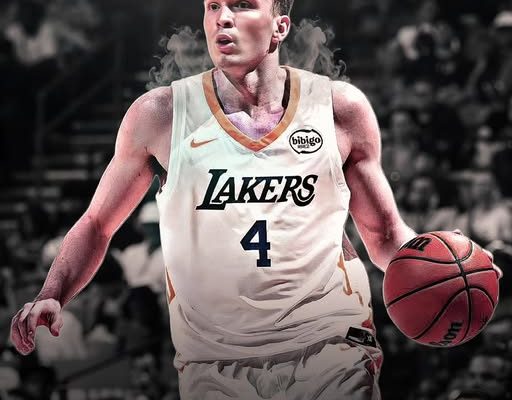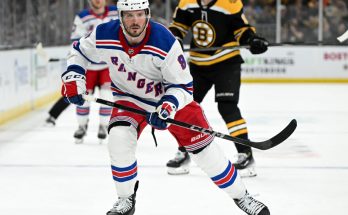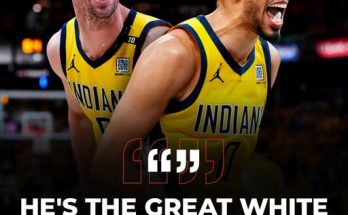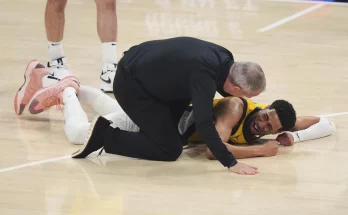Dalton Knecht entered the NBA Summer League as one of the most talked-about rookies in the 2024 class. Drafted 17th overall by the Los Angeles Lakers, Knecht was widely seen as a steal, a mature scorer with an NBA-ready offensive game. After a stellar season at Tennessee where he dazzled with his athleticism, shot-making, and leadership, his stock was soaring. Analysts praised the Lakers for picking a player who could contribute immediately to a team hoping to contend with LeBron James and Anthony Davis still in the fold. But just weeks later, the narrative has flipped dramatically. According to multiple reports from league insiders, Knecht’s trade value has plummeted following a disappointing Summer League performance, and teams around the league no longer view him as a viable first-round asset. It’s a stunning fall in perception for a player once thought to be one of the safest picks in the draft.
The issues that emerged during the Summer League were both subtle and alarming. For starters, Knecht’s scoring efficiency took a nosedive. He shot poorly from the field, particularly from three-point range, where he was expected to thrive. His release, which was quick and fluid in college, looked rushed and mechanical under NBA-level closeouts. Defenders were able to crowd him more easily than expected, exposing limitations in his handle and first step. The result was a player who looked less like a plug-and-play contributor and more like a developmental piece — a jarring revelation given how heavily the Lakers were relying on his offensive polish.
What’s more troubling is that these struggles didn’t appear to be mere jitters. Scouts and executives observed that Knecht seemed physically overmatched. Though listed at 6’6” and 210 pounds, he lacked the strength to finish through contact and the agility to separate from quicker defenders. His attempts to create off the dribble often ended in stagnant possessions or forced shots. In transition, where his athleticism was supposed to be a weapon, he failed to make the impact many anticipated. For a player who was hyped for his explosiveness and NBA-ready body, he looked surprisingly earthbound against quicker, more aggressive competition.
Defensively, the concerns that had been whispered about throughout the draft process became impossible to ignore. Knecht struggled to stay in front of ball handlers, often getting caught on screens or late to recover on rotations. His awareness off the ball also lagged behind, leading to missed assignments and open shots for opposing wings. Teams now believe that any defensive contributions from him will be minimal, if not outright liabilities, especially in the high-stakes settings of playoff basketball. That’s a huge red flag for a player whose main calling card was scoring — because if he can’t defend and he’s not scoring efficiently, his role becomes hard to define.
One NBA executive, speaking anonymously, said, “We had a first-round grade on Knecht before the draft, but what we saw in Vegas really made us reconsider. He’s got tools, but he’s not ready to help a team win right now. You draft a senior who’s already 23 years old, you expect him to come in and play. What we saw looked more like a G League project than a rotational rookie.” That kind of critique has been echoed across several front offices, including teams that were initially interested in acquiring Knecht in a potential trade scenario. The buzz that once surrounded him as a trade asset has all but evaporated.
The Lakers themselves now find themselves in a difficult position. Knecht was viewed as a critical piece of any “consolidation trade” they might pursue to upgrade their roster. With his trade value diminished, he no longer provides the leverage they had hoped for. Teams looking to extract a promising young player from L.A. in exchange for a veteran or rotation piece are asking for more than just Knecht — and in some cases, not asking for him at all. That complicates trade talks and puts pressure back on the Lakers’ front office to find alternative assets to move.
There’s also the internal pressure mounting within the organization. Some scouts inside the Lakers’ camp are reportedly disappointed that Knecht hasn’t shown more growth since draft night. While they still believe in his long-term potential, the reality is that the Lakers are not a team that can afford to wait on development. With LeBron James inching closer to the end of his career and the Western Conference as competitive as ever, the franchise is in win-now mode. That doesn’t leave much margin for error when it comes to rookie production.
From a psychological perspective, the pressure on Knecht has also increased. He’s gone from being viewed as a hidden gem to being labeled as a disappointment — and that’s a tough swing to manage, especially for a player still adjusting to the NBA lifestyle. Confidence can waver quickly in the league, particularly when social media, analysts, and even your own organization begin to express doubt. How Knecht responds to this adversity will go a long way in determining whether this is merely a rough start or the beginning of a larger struggle to find his footing at the next level.
It’s worth noting that the Summer League isn’t always an accurate predictor of NBA success. Many future stars have stumbled in July only to shine come October. But the context matters here. Knecht was supposed to be one of the most NBA-ready players in the class. He wasn’t a 19-year-old raw prospect coming out of a European league. He was a fifth-year senior who had dominated the SEC and proved himself against high-level competition. If anyone was expected to hit the ground running, it was him. That he didn’t has changed how teams perceive his ceiling — and his floor.
Another factor contributing to the drop in value is how other rookies have performed by comparison. Several players drafted after Knecht have looked better — more athletic, more versatile, more poised. That naturally reshuffles the value hierarchy among rookies. Scouts have already started adjusting their internal boards retroactively, and in several cases, Knecht has dropped out of first-round consideration entirely in informal re-rankings. For a player trying to build early momentum in his career, that’s a hard blow to absorb.
There’s also a growing belief that Knecht may not have a defined role at the next level. Is he a scorer off the bench? A three-and-D wing? A secondary ball handler? The answer to all these questions remains unclear. And in the NBA, uncertainty often leads to reduced value. Front offices crave role clarity — the ability to plug a player into a lineup and know what you’re getting. Right now, with Knecht, the picture is too blurry. He has talent, yes, but his fit is questionable, and teams are no longer convinced he’ll provide early returns.
It’s still early, of course. There’s a full preseason, training camp, and potentially G League reps ahead. Knecht has the work ethic and maturity to fight through this slump and reshape his narrative. There’s no reason to write him off entirely based on a handful of rough games in July. But in a league where perception often guides opportunity, the damage may already be done — at least in the short term.
For the Lakers, it means recalibrating expectations. Knecht may no longer be the sweetener in a trade package they envisioned. He might now need to focus on internal development, embracing a slower path to NBA relevance. And for Dalton Knecht himself, it’s a wake-up call. The league moves fast, and so do reputations. What he does next — in practice, in the film room, in preseason — will determine whether this dip in value is a temporary hiccup or the beginning of a long road to redemption.



